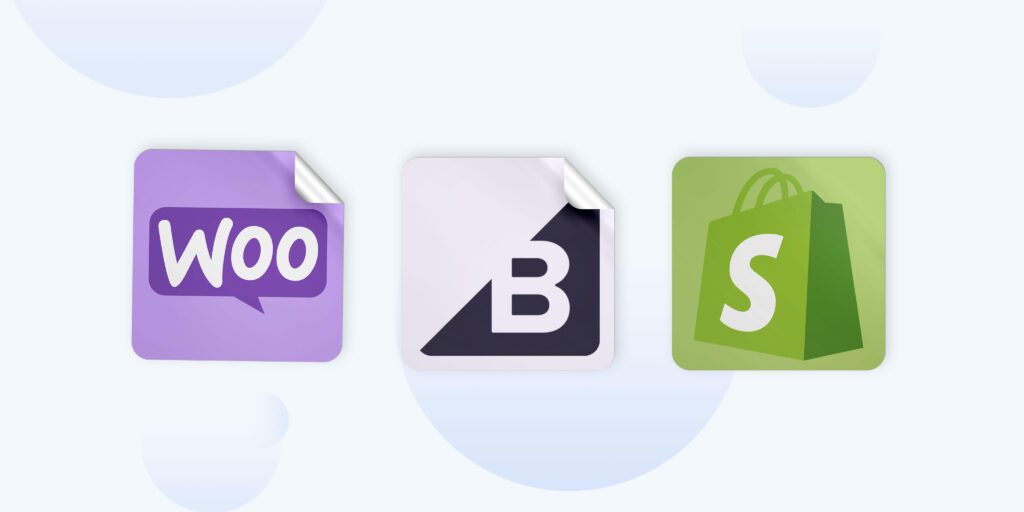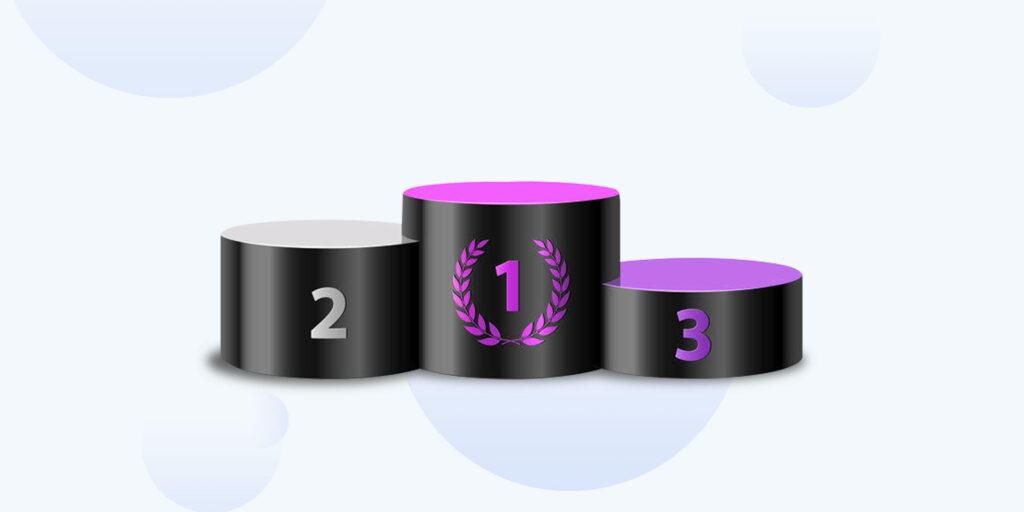
Are you looking for the best ecommerce platform or the best dropshipping platform to launch your online business?
With so many options out there, it can be overwhelming to choose the right one. In this blog post, we’ll compare three popular platforms: Shopify, WooCommerce, and Bigcommerce, to help you decide which one is the best fit for your business.
Whether you’re just starting out or you’re an established online retailer, we’ll break down the features, pricing, and user experience of each platform to help you make an informed decision. Let’s dive in!

When it comes to setting up an online store, there are numerous ecommerce and dropshipping platforms to choose from. Among them, Shopify, WooCommerce, and Bigcommerce are some of the most popular options available.
Shopify is a hosted ecommerce platform that allows users to easily create an online store. It offers a wide range of features, including multiple payment gateways, inventory management, and shipping options.
WooCommerce, on the other hand, is a free, open-source plugin for WordPress websites that allows users to turn their site into an ecommerce store. It is known for its flexibility and customization options. Lastly,
Bigcommerce is another popular ecommerce platform that offers a wide range of features such as payment processing, marketing tools, and more.
Each platform has its unique features, pricing, and ease of use. It is important to evaluate each one before choosing the best platform for your online store.
At Console Creative, we are more than happy to help you create your e-commerce or dropshipping website. Get a quote here
One of the first things many business owners consider when choosing an e-commerce or dropshipping platform is pricing. Shopify, WooCommerce, and Bigcommerce all offer different pricing structures and plans to choose from.
Shopify has a variety of plans, ranging from Basic Shopify at $29 per month to Advanced Shopify at $299 per month. There is also a Shopify Lite plan for $9 per month, which allows businesses to sell through Facebook and other social media platforms. Additional fees may apply for credit card processing and third-party apps.
WooCommerce, on the other hand, is a free plugin for WordPress, but users will need to purchase web hosting and a domain name. WooCommerce also offers paid extensions and themes that can enhance the platform’s functionality and design.
Bigcommerce has several pricing plans, with their standard plan starting at $29.95 per month and their Pro plan at $299.95 per month. Like Shopify, additional fees may apply for payment processing and third-party apps.
When considering pricing, it’s important to think about the size of your business and your specific e-commerce needs.
While Shopify may be more expensive than WooCommerce or Bigcommerce, it offers more built-in features and may be a better option for larger businesses. WooCommerce and Bigcommerce may be more cost-effective for smaller businesses or those with less complex e-commerce needs.
At Console Creative, we are more than happy to help you create your e-commerce or dropshipping website. Get a quote here
One of the most important factors when choosing an e-commerce or dropshipping platform is the ability to customize it to your business needs.
Shopify is a hosted e-commerce platform that offers a variety of built-in features, including a robust shopping cart system, product catalogue, and payment processing. In addition, Shopify has a large library of apps and integrations that can be used to enhance functionality and customize the platform to your specific needs.
Shopify’s customization options include a user-friendly drag-and-drop website builder, which allows you to create a custom storefront without any coding knowledge. Additionally, Shopify offers access to their Liquid templating language, which provides advanced customization capabilities for those with coding skills.
WooCommerce is a plugin for the popular WordPress content management system, which means it is a self-hosted e-commerce platform. WooCommerce offers a variety of built-in features, including a shopping cart system, payment processing, and shipping options.
Customization options for WooCommerce are nearly endless due to the vast number of WordPress plugins and themes available. With thousands of plugins to choose from, you can easily add functionality such as social media integration, email marketing, and more.
Bigcommerce is a hosted e-commerce platform that offers a variety of built-in features, including a shopping cart system, payment processing, and shipping options. Bigcommerce also offers access to its own API and developer tools, allowing for even greater customization capabilities.
Bigcommerce’s customization options include a drag-and-drop website builder, as well as access to their Stencil theming engine for those with coding knowledge. Bigcommerce also offers an extensive app store, featuring integrations for marketing, social media, and shipping.
Overall, Shopify, WooCommerce, and Bigcommerce all offer strong customization options. The platform that is best for you will depend on your specific business needs and level of technical expertise.
Have special features you require for your online store? At Console Creative, we are more than happy to help you create your e-commerce or dropshipping website with all the features your online store requires.. Get a quote here
When it comes to creating an online store, ease of use and set-up process are essential factors to consider.
The less time and effort you need to invest in building your e-commerce website, the faster you can start selling and earning. In this section, we’ll compare the ease of use and set-up process of Shopify, WooCommerce, and Bigcommerce.
Shopify is known for its user-friendly interface, making it an ideal choice for beginners with no coding skills. With Shopify, you don’t need to worry about technical details such as hosting, security, or updates.
Shopify takes care of everything for you, including SSL certificates, automatic updates, and backups. All you need to do is sign up for a plan, choose a template, and start customizing your online store.
WooCommerce is an open-source e-commerce platform that runs on WordPress, the most popular content management system worldwide.
Setting up a WooCommerce store requires more technical knowledge than Shopify, as you’ll need to handle the hosting, security, and updates yourself.
However, WooCommerce offers more customization options, and you have full control over your store’s design and functionality.
Bigcommerce is a hosted e-commerce platform that combines ease of use with advanced customization options. Bigcommerce offers an intuitive drag-and-drop editor, allowing you to customize your store’s design without any coding knowledge.
Moreover, Bigcommerce provides built-in SEO and marketing tools to help you optimize your store for search engines.
In terms of ease of use and set-up process, Shopify is the clear winner, as it’s the most user-friendly platform with the least technical requirements. However, if you’re looking for more customization options and control over your store, WooCommerce and Bigcommerce are viable options to consider.
Want special custom made features for your online store? At Console Creative, we are more than happy to help you create your e-commerce or dropshipping website with all the features your online store requires.. Get a quote here

When it comes to online shopping, first impressions matter.
That’s why choosing a platform with appealing design and customizable templates is crucial for your success. Let’s take a look at how Shopify, WooCommerce, and Bigcommerce compare in terms of design and templates.
Shopify offers over 100 free and premium templates to choose from, each of which is fully customizable using Shopify’s drag-and-drop editor.
You can also upload your custom designs and code to make your website stand out from the crowd. Additionally, Shopify’s themes are mobile-responsive, ensuring that your store looks great on any device.
WooCommerce provides over 2,000 free and paid themes, making it the most extensive theme library among the three platforms. Many of these themes come with customizable design options and responsive layouts. However, customization options can vary depending on the theme you choose.
Bigcommerce provides a range of fully responsive, mobile-friendly templates to choose from, with various customization options available through the platform’s built-in editor. You can also upload your designs or customize your HTML and CSS.
Overall, all three platforms offer a wide range of templates and customization options to create a professional-looking online store.
However, Shopify stands out as the most user-friendly, providing the easiest and most intuitive customization experience.
WooCommerce has the most extensive theme library, while Bigcommerce offers more built-in design and editing options.
Ultimately, the best platform for you depends on your level of design expertise and the specific needs of your business.
Want the best design for your online store? At Console Creative, we are more than happy to help you create your e-commerce or dropshipping website with the most attractive design you can ever find available. Get a quote here
When it comes to selling online, offering seamless payment gateways and flexible shipping options is critical. In this section, we’ll compare the payment gateways and shipping options available in Shopify, WooCommerce, and Bigcommerce.
Shopify offers a variety of payment gateways including Shopify Payments, which allows you to accept credit card payments without having to integrate with a third-party provider.
They also support PayPal, Apple Pay, and Google Pay. In terms of shipping, Shopify offers real-time shipping rates from major carriers, as well as the ability to print shipping labels and manage shipments all from within the platform.
WooCommerce is an open-source platform, which means you can use any payment gateway you like, including PayPal, Stripe, and Square. Additionally,
WooCommerce offers built-in shipping functionality that allows you to print shipping labels, manage shipments, and offer free shipping options.
Bigcommerce, like Shopify, offers its own payment gateway called Bigcommerce Payments, as well as integrations with PayPal, Stripe, and others. T
hey also offer real-time shipping rates, automated shipping label printing, and the ability to manage shipments within the platform.
Overall, each platform offers a variety of payment gateway and shipping options to meet your needs.
However, Shopify may have a slight edge in terms of ease of use, as everything is built into the platform. WooCommerce and Bigcommerce, on the other hand, offer more flexibility when it comes to payment gateway choices. It ultimately comes down to your specific needs and preferences.
Having reliable customer support and access to resources is crucial when it comes to running an online store. Let’s see how Shopify, WooCommerce, and Bigcommerce fare in this aspect.
Shopify offers 24/7 support through live chat, email, and phone. They also have an extensive help center, where you can find answers to common questions and browse through guides and tutorials.
Additionally, Shopify has a large community forum where you can interact with other store owners and get tips and advice.
WooCommerce, being a WordPress plugin, doesn’t have direct customer support.
However, they have an active community forum and a documentation section with tutorials and articles to help you solve issues. You can also purchase premium support plans from third-party providers.
Bigcommerce provides 24/7 support through phone, email, and live chat. They also have a knowledge base with articles and guides and a community forum where you can ask questions and connect with other users.
When it comes to resources, all three platforms offer various materials to help you set up and manage your online store.
Shopify and Bigcommerce have their own app stores where you can find and install extensions and plugins to add extra functionality to your site. WooCommerce, on the other hand, has access to the vast collection of WordPress plugins.
In terms of customer support and resources, all three platforms are excellent choices. However, Shopify’s 24/7 support and active community forum give it an edge over WooCommerce and Bigcommerce.
In terms of SEO and marketing capabilities, Shopify is often regarded as the leader among the three platforms. It has a built-in SEO feature that enables you to optimize your site for search engines easily.
You can also edit the title tags, meta descriptions, and URLs of your pages. Shopify also allows you to create discounts and promotions to attract customers.
WooCommerce, on the other hand, requires a plugin like Yoast SEO to enhance its SEO capabilities.
However, once installed, the plugin can be a powerful tool that helps optimize your pages for search engines.
WooCommerce also offers a wide range of marketing tools like coupons, product bundles, and personalized recommendations to increase customer retention and sales.
Bigcommerce also has a robust set of SEO tools and capabilities. It enables you to customize the metadata of your pages, add Google Analytics and Google Search Console to monitor traffic and make adjustments, and optimize your content for specific keywords.
Additionally, Bigcommerce has a built-in blog feature that can be a useful tool in increasing website traffic.
Overall, Shopify and Bigcommerce offer the best SEO capabilities. However, WooCommerce is not far behind, and with the right plugins and setup, it can also be an excellent platform for SEO and marketing. Ultimately, the platform you choose will depend on your business needs and priorities.
Want to have a search engine optimized online store? At Console Creative, we are more than happy to increase traffic to you online store with SEO or create a search engine optimized e-commerce or dropshipping website from the scratch. Get a quote here
In terms of Integrations and Add-Ons, all three platforms offer a wide range of options to extend the functionality of your online store.
Shopify has over 3,200 apps available in their app store, with many popular integrations like Mailchimp, Google Analytics, and Quickbooks. Their app store also features several third-party themes, plugins, and integrations to enhance your store’s design, SEO, and marketing capabilities.
WooCommerce is a plugin for WordPress, so it benefits from the vast library of plugins and integrations available in the WordPress ecosystem. This includes integrations with popular email marketing services, payment gateways, and shipping providers, among others.
Bigcommerce also has an app store that includes over 500 apps and integrations. Their integrations include a wide range of marketing tools, payment gateways, and shipping options.
However, some users have noted that some integrations are limited in functionality and may require customization or additional development work.
Overall, Shopify’s app store has the largest selection of integrations and add-ons, but WooCommerce and Bigcommerce both have extensive integration options through their plugin library and app store, respectively.
It’s important to consider the specific needs of your business when choosing a platform based on integrations and add-ons.

It’s time now to decide which platform is the best fit for your business.
If you’re a small business with a limited budget and want a user-friendly platform that’s easy to set up and use, WooCommerce might be your best choice.
WooCommerce offers free and paid themes that you can customize to your liking, and it also offers free and paid plugins that you can add to extend its functionality. It also integrates with WordPress, which means you’ll have access to a wide range of free and premium plugins to add more features to your store.
If you’re a larger business that needs more advanced features like abandoned cart recovery, product recommendations, and a wider selection of payment and shipping options, Shopify might be the way to go.
Shopify offers a wider range of payment gateways and shipping options compared to WooCommerce and Bigcommerce, which makes it ideal for businesses with a global customer base. It also offers a wide range of integrations and add-ons, which means you can add more functionality to your store as your business grows.
Bigcommerce is the best choice if you’re looking for a more comprehensive solution that can handle all aspects of your online store.
It has a wider range of features and customization options than WooCommerce and a more user-friendly interface than Shopify. It also offers better support and resources than the other two platforms, which can be helpful if you’re new to eCommerce.
Ultimately, the choice between Shopify, WooCommerce, and Bigcommerce depends on your budget, business size, and needs.
Ready to get started with us at Console Creative so we can develop your dropshipping or ecommerce website using any of the platforms we have just compared?
Click this link to get a quote now.
Tags: bigcommerce, dropshipping, ecommerce, shopify, web development, woocommerce